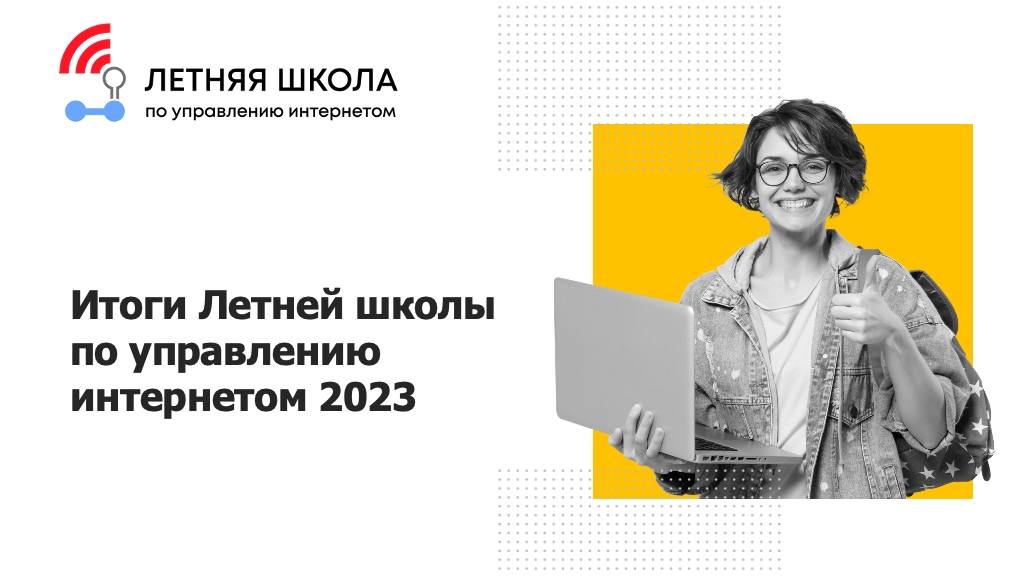
The results of the Summer School on Internet Governance 2023 were summed up on August 24. The Coordination Center for TLD .RU/.РФ held the School for the fourth time, and year by year the number of applications from those wishing to study is increasing. 298 applications for the Summer School were submitted this year from 9 different countries. 95 persons were admitted to the initial, preparatory, and qualifying stage. Of them, 40 continued their education at the main stage, successfully completed their studies, and got diplomas from the school's partner, St. Petersburg State University, proving that they had mastered the additional education. The main stage is a program of additional education from St Petersburg University and involves interaction with experts and practitioners in the field of Internet Governance at thematic lectures and discussions.
We wrote about the first stage of the School earlier, and today we will talk about the classes of the main stage. As part of the second stage of training, lectures were held on a variety of topics from the field of Internet governance.
On the first day of the main stage, Ilona Stadnik (St. Petersburg State University) spoke about the origins of the idea of the Global Digital Compact: when and under what circumstances it arose, what is the current implementation and what are the prospects for this project in the near future. In addition, the participants discussed how the concept of the Global Digital Compact correlates with the concept of Internet Governance and global processes in this area.
On the same day, there was a lecture entitled "Civil Information Society - Dangers of Techno-Humanitarian Imbalance". Marianna Alborova (MGIMO), as part of this lecture, considered the civil information society, in particular aspects of the impact of the Internet on society. The expert paid special attention to the need to achieve a techno-humanitarian balance between three variables: technological potential, the quality of cultural and psychological regulation, and the internal stability of society.
On the second day of classes, students listened to a lecture on the issue of freedom of speech and the limits of such freedom. This issue has become especially acute in connection with the spread of destructive content, and today the approach to this topic is key in the regulation of content in all states. Anna Sutyrina-Dupan (Higher School of Economics) spoke about the balance between the fundamental right to freedom of information, the impact of online harm, and the real possibilities of moderating huge streams of content in real time.
After a lecture on freedom of speech and hate speech, Anna Sytnik (St. Petersburg State University) gave a lesson on the risks and prospects of using generative AI for society. The lecture was devoted to the mutual influence of three components: generative AI technology, social structure and international relations. The expert explained the principles of training and operation of generative AI and, together with the audience, tried to figure out whether this breakthrough technology will lead to a new phase of development.
Then experts from the RANEPA, St. Petersburg State University and St. Petersburg State University of Technology discussed the completed tasks with the students and gave instructions on how to prepare a group project for the final certification.
The graduates of the Summer School highly appreciated the training - its organizational component, the expertise of the lecturers, the selection of topics and assignments for self-study and group projects. At the final meeting, students noted that their understanding of the subject of Internet Governance has changed and expanded, which was one of the objectives of the Summer School:
“It was not only an interesting, but also an unexpectedly pleasant experience - it helps to believe in yourself and set goals!” – Marina Moiseeva (International Relations).
“My opinion on the subject of internet governance have definitely changed, going from having none to writing a joint scientific essay! And we are writing an article with a girl whom we met at school,”– Elena Godina (computer science and information technology).
“The school expanded my understanding of direction by understanding the role of all stakeholders in the process. The course turned out to be useful for me, certain thoughts appeared regarding my future scientific research,”– Gulnaz Yaglyamunova (international relations).
“I didn’t think before that this is such a wide area in which you can really specialize. Now there is an idea that such activities to organize the Internet space will be needed more and more, because the further technology develops, the more we transfer the problems of our real world into virtuality,”– Karina Strebkova (computer linguistics and cognitive psychology).
Curator of the Summer School on Internet Governance 2023 Anastasia Savelyeva (St. Petersburg State University of Telecommunications) said that not only her idea of the topics of lectures, but also of the School as a whole has changed: a graduate of the course, and this year had the opportunity to take a direct part in the organization and conduct. Separately, I would like to note that special positive emotions are caused by the clearly demonstrated personal growth of students, the level of their interaction within the School, and even, despite different professional activities, establishing contacts outside the project.”
The best alumni essays will be published on the Internet Governance Summer School website.



